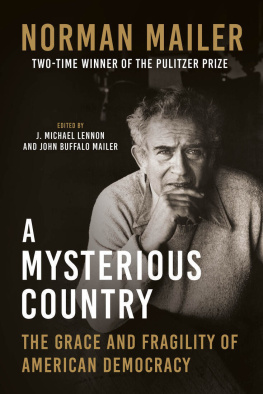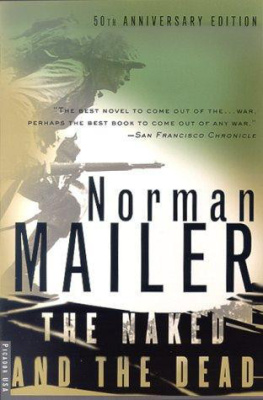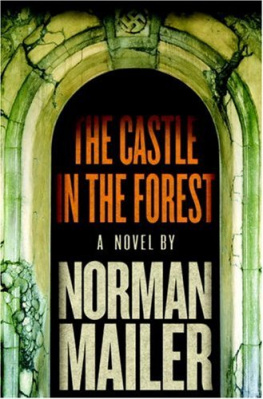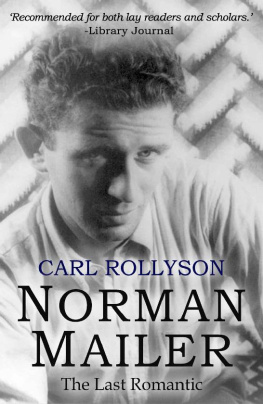
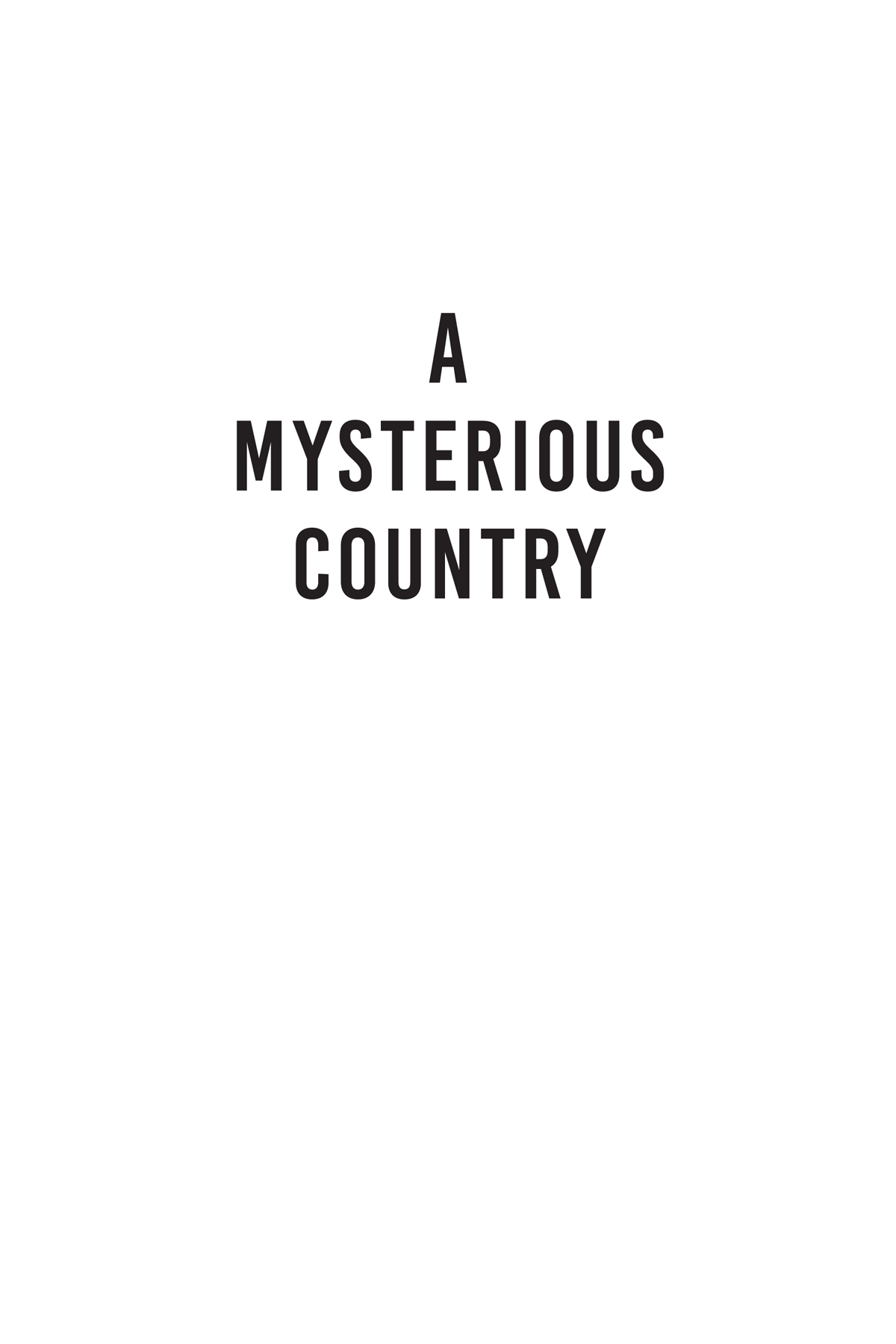
Also by Norman Mailer
The Naked and the Dead
Barbary Shore
The Deer Park
Advertisements for Myself
Deaths for the Ladies (and Other Disasters)
The Presidential Papers
An American Dream
Cannibals and Christians
The Short Fiction of Norman Mailer
The Deer Park: A Play
Why Are We in Vietnam?
The Armies of the Night
Miami and the Siege of Chicago
Of a Fire on the Moon
The Prisoner of Sex
Maidstone
Existential Errands
St. George and the Godfather
Marilyn
The Faith of Graffiti
The Fight
Genius and Lust
The Executioners Song
Of Women and Their Elegance
Pieces and Pontifications
Ancient Evenings
Tough Guys Dont Dance
Harlots Ghost
Oswalds Tale: An American Mystery
Portrait of Picasso as a Young Man
The Gospel According to the Son
The Time of Our Time
The Spooky Art
Why Are We at War?
Modest Gifts
The Big Empty (with John Buffalo Mailer)
The Castle in the Forest
On God (with J. Michael Lennon)
Mind of an Outlaw
Selected Letters of Norman Mailer

Copyright 2023 by Norman Mailer Enterprises, LLC
All rights reserved. No part of this book may be reproduced in any manner without the express written consent of the publisher, except in the case of brief excerpts in critical reviews or articles. All inquiries should be addressed to Arcade Publishing, 307 West 36th Street, 11th Floor, New York, NY 10018.
First Edition
Arcade Publishing books may be purchased in bulk at special discounts for sales promotion, corporate gifts, fund-raising, or educational purposes. Special editions can also be created to specifications. For details, contact the Special Sales Department, Arcade Publishing, 307 West 36th Street, 11th Floor, New York, NY 10018 or .
Arcade Publishing is a registered trademark of Skyhorse Publishing, Inc., a Delaware corporation.
Visit our website at www.arcadepub.com.
Visit the authors site at jmichaellennon.com.
10 9 8 7 6 5 4 3 2 1
Library of Congress Cataloging-in-Publication Data is available on file.
Library of Congress Control Number: 2022949744
Cover design by Erin Seaward-Hiatt
Cover photo: Fred W. McDarrah/Getty Images
ISBN: 978-1-956763-37-9
Ebook ISBN: 978-1-956763-59-1
Printed in the United States of America
We dedicate this book to our wives,
Donna Pedro Lennon and Claudia Maree Mailer.
Without their generous help, this book would not exist.
Re-reading the bulk of my work in the course of a spring and summer, one theme came to predominateit was apparent that most of my writing was about America. How much I loved my countrythat was evidentand how much didnt I love it at all! Our noble idea of democracy was forever being traduced, sullied, exploited, and downgraded, through a non-stop reflexive patriotism. And every decade our great land lay open more and more to all the ravages of greed.
What a curiosity is our Democracy, what a mystery. No novelist unwinds a narrative so well.
The Time of Our Time (1998)
C ONTENTS
E DITORS N OTE
Mailer, like most writers of his time, used the word Negro when referring to someone from the Black community. It was meant as a term of respect, much the way African American is intended as a term of respect today. Mailer also uses the masculine pronoun when referring to humankind, which was the standard for writers of his generation but can seem off-putting when read through the lens of todays filters.
Given the sensitivities of the current climate, we considered updating some of the verbiage Mailer employed from the earlier decades covered in this book in order to accurately reflect his intentions to the younger audience of today, but thought better of it. To change words in Mailers sentences would be the equivalent of plucking notes out of a symphony from another day. So, we ask the reader to read Mailers words within the context of the time in which he was writing and to savor the cornucopia of prescient insights he offers us on how we, Americans all, have arrived at the troubled waters we now navigate, and how we can reach safe haven.
Square brackets are used throughout for editorial additions to the excerpts from Mailers work. Source notes at the end of the book provide detailed bibliographical information on the contents. Mailers original titles are in quotation marks; those of the editors are not.
I NTRODUCTION
At the midpoint of The Big Empty, a 2006 collection of speeches, interviews, and conversations between Mailer and his son John Buffalo about the state of the nation after the 9/11 attacks and the Iraq War they precipitated, Mailer made a prophetic statement:
You know, under all my remarks rests a very unhappy premise. Fascism may be more to the tastes of the ruling powers in America than democracy. That doesnt mean well be a fascist country tomorrow. There are any number of extensive forces in America that would resist it. On the other hand there are also huge forces in America that are promoting fascism in one way or another.
Mailer had spoken and written of his fears many times prior to this, all the way back to 1948 when, during a campaign speech for Henry A. Wallace, the Progressive Party presidential candidate, he called Wallace the only national figure who is an obstacle to fascism in America. But his 2006 comment to his son is perhaps the clearest statement about the predilections in the American character for a homegrown variety of fascism. Mailers commentary over the decades notes that, like twentieth-century European varieties, the American brand would be rooted in racism, xenophobia, cronyism, flag-waving, and fraudulent elections. But he also foresaw that creeping fascism would incorporate idiosyncratic native traitsrugged individualism (guns aplenty), corporate freebooting, religious fundamentalism, and an indifferent if not rapine attitude toward the environment. He rejected the idea that such a serious and divisive ultranationalistic movement could be imported. After the fall of the Soviet Union in 1991, his warnings increased and became more vehement as he watched the loss of a common enemy turn our anger and fear upon ourselves.
Now, after the assault on the Capitol and the ever-increasing divide between those who feel enthusiasm for Donald Trump and those who view him as an unprecedented threat to our democracy; after a global pandemic and a growing divide between rich and poor; after peaceful demonstrations have led to chaotic violence in the streets fueled in part by social mediathe worldwide experiment started with no understanding about the effects it would have on our collective psyche and our freedomnow, as Americans find themselves navigating the overlapping effects of these profound events and changes, it is clear that Mailer was correct: fascism, not yet dominant, is festering within the American body politic.
His premonitions can be traced back to his mother, who came to the United States in 1894 as a three-year-old refugee from Lithuania. As Mailer recalled a year before the end of his life, Fan Mailer was deeply affected by the European wars and dislocations during the first decades of the twentieth century. The horrendous events in Germany in the 1930s caused my mother pain, he said, adding that it seemed she knew in advance what would happen.
Next page
